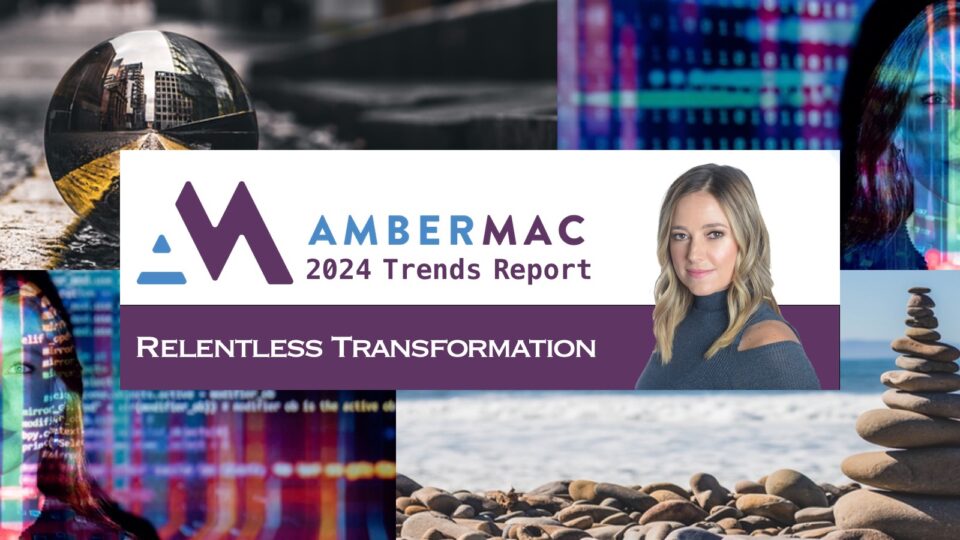
AmberMac 2024 Trends Report: Relentless Transformation
by Amber Mac on January 12, 2024
My 2023 Amber Mac Trends Report (published last January) featured four pillars of change – Purpose, AI, Trust, and Health – and a framework for survival – a blueprint I call The P.A.T.H. One year later, what surprises me is how quickly this change is happening, and how it puts pressure on each of us to relentlessly transform – both as individuals and as leaders of organizations.
After all, there’s now more research at our fingertips showing a strong link between purpose-driven companies and higher performance and profits. On the AI front, ChatGPT continues to take the world by storm and is now approaching its 5th iteration. Trust remains on shaky ground with worldwide implications as we enter into an historic year of elections. The global healthcare crisis is getting worse, which Deloitte contributes to “lingering COVID-19 effects (that) are still contributing to widespread labor shortages and escalating costs”.
In this year’s annual Amber Mac Trends Report, I drill down into these 4 pillars, unpacking where we’re heading this year and beyond. While 2023 was about adapting to change after a chaotic pandemic shifted our daily lives, I think 2024 is a year for relentless transformation. To be clear, the term “relentless” has both positive and negative implications, and in the context of this 2024 framework, I’m using it to imply strength, persistence, and consistency.
As always, my Amber Mac Trends Report is sprinkled with hope. In this regard, we have clear choices in our lives: to be hopeful and helpful or to be helpless and hurtful. We have enough hurt on the horizon already, so I hope this framework can be a tool to helpfully move us towards a better future.

PURPOSE
Before we jump into the importance of purpose, let’s talk about growing risks. The World Economic Forum predicts that within the next decade the top 5 risks will be centered around our failure to mitigate climate change. Along with this overwhelming challenge, we will also continue to see erosion of social cohesion and increasing societal polarization. We’ll tackle the second of these two risks in the next section, but here let’s address the critical role of purpose in a hurting world.
Harvard Business Review and the EY Beacon Institute report: “Companies with a strong sense of purpose are able to transform and innovate better. Those executives who treat purpose as a core driver of strategy and decision-making reported greater ability to drive successful innovation and transformational change and deliver consistent revenue growth.”
I often hear that (almost) every modern organization now has “purpose” on its roadmap. However, actions don’t often mirror what we see “on paper”. This distinction matters, not just to an organization’s reputation, but also to its bottom line. According to a global study released by communications firm Zeno, “four times more consumers are likely to buy from purpose-driven companies”. In France, it’s now written into the law that organizations consider environmental and societal impacts of their businesses (the PACTE Law of 2019).
To add to this evidence, there is a massive climate opportunity that exists right now. This includes offering new products and services, reaping the benefits of energy independence, and realizing a longer business cycle (we’re just starting to see a shift in much of the business world from short-term profits to long-term results).
A beacon of hope on this front is Yvon Chouinard, the 85-year-old founder of Patagonia and one of Time Magazine’s most influential people. As I’ve shared in my keynotes over the past few months, Chouinard didn’t just start respecting his customers and protecting the planet when it was trendy to do so. Instead, he is the relentless transformation GOAT (greatest of all time). In 2013 (see video link below), Chouinard rejected a journalist’s comparison of himself to Apple’s founder Steve Jobs, saying that while Apple focuses on selling disposable items (which their owners were not allowed to repair for many years), Patagonia is relentlessly committed to encouraging customers to repair damaged gear before buying something new.
Today, Chouinard has more company on his purpose-driven quest. In an IBM 2024 tech trends post, the company cites that leaders are starting to better understand the importance of a purpose-driven strategy, especially on the climate front, sharing that “sustainability is now ranked by as many as half of all Canadian CEOs as their primary focus.”
Watch: In Conversation with Patagonia’s Yvon Chouinard

A(I)DAPTATION
Microsoft just announced it is putting an AI key on its Windows 11 laptop and on other devices in the months ahead. As CNET reports, “The dedicated Copilot key is the biggest change since Microsoft introduced the Windows key in 1994.” The tech company’s Executive Vice President and Consumer Chief Marketing Officer explains, “we believe it will empower people to participate in the AI transformation more easily.”
Whether you’re ready or not, “AI will continue to improve quickly, with capabilities doubling roughly every six months – three times faster than Moore’s law“.
In response to this change, let’s talk skills. There is a growing gap that exists, and little time to close it. As one example, from the World Economic Forum, “executives estimate that 40% of their workforce will need to reskill in the next three years as a result of implementing Artificial Intelligence”. Integrating AI into your every day is now a must to increase productivity. For leaders in all industries, there is also a responsibility to direct teams on this reskilling journey, which can be done with ongoing education and training.
As a keynote speaker, I see today’s leading organizations focus on one large annual event for dedicated learning. This model is no longer fully effective. While annual meetings are essential for face-to-face networking and relationships, there is an emerging need for ongoing education and training if an organization wants to retain its best employees, and reap the benefits that AI can offer.
Read: 5 Trends Workers Need to Know

TRUST
Billions of people around the world in more than 50 countries (a record high according to Sky News) are heading to the polls in 2024. Alongside this milestone, we’re experiencing a synthetic content boom. For marketing professionals, AI is helping to increase creative capacity. For democratic institutions, AI is nudging us further down a path of distrust.
As Eurasia Group shares in this week’s global risks report, “generative AI will be used by domestic and foreign actors – notably Russia – to influence electoral campaigns, stoke division, undermine trust in democracy, and sow political chaos on an unprecedented scale”.
If trust were a triangle, it would feature three sides: communication, consistency, and transparency. For leaders looking to build trust – which quite frankly should be all of us – we need to put these three actions on repeat. Thanks to the ability to manipulate media of all kinds – whether text, photos, or videos – seeing is no longer believing. That means that building trust relentlessly is paramount.
As one example, consider the adoption of generative artificial intelligence tools. As EY explains, in order to navigate the current absence of AI regulations, “organizations need to establish a Generative AI Governance framework that is unbiased, resilient, explainable, transparent, and performance-based”. Small organizations can and should also develop AI usage guidelines to clearly communicate both internally and externally how this technology is being used.
Now is the time to actively improve all levels of communication in a consistent and transparent manner to elevate trustworthy human-to-human relationships.
Read: The Problem of Misinformation in an Era Without Trust

Health
As health systems around the world struggle to keep up with the demands of patients, many individuals are turning to technology for ongoing and preventative care for both their mental and physical health. This week at the Consumer Electronics Show in Las Vegas, we’re seeing hundreds of these innovations come to life. Withings, which is best known for its smart scales, just announced a new product called the BeamO multiscope that “combines ECG, pulse oximeter, stethoscope, and thermometer sensors into a single device”. According to Withings, “the BeamO is the at-home thermometer of the future, not only able to measure temperature but also to provide feedback on heart and lung health”.
We’re also seeing the launch of a smart mirror for mental health check-ins, a consumer-focused UTI (Urinary Tract Infection) test, and lots more. Heck, even pets are benefitting from this DIY health-tech trend: a company called Invoxia just unveiled a smart dog collar, so you can “easily monitor your pet’s heart health, position, activity, appetite, behavior, and whereabouts” using AI.
Beyond the home, AI is also improving healthcare outcomes. “As medicine is still often too imprecise and not sufficiently personalized… improved diagnosis is one place where AI could benefit patients soonest“.
Many of the big tech players are hoping to capitalize on this growing space, including Google’s commitment to provide access to better skin disease information. As the company outlines on its site, “through computer vision AI and image search capabilities, we are developing a tool to help individuals better research and identify their skin, hair, and nail conditions”.
Keep an eye on this space – not just for incredible stories and examples of true innovation at work, but for the sake of your own health.
Download: Apps for Goal-Setting
In conclusion, relentless transformation is the P.A.T.H. to follow for many of us in 2024. While a lot of tech trend reports focus solely on new innovations and challenges in this space (especially related to AI and Trust), the P and the H of my blueprint (Purpose and Health) need more attention.
After all, if our planet is unhealthy and we are unhealthy, not much else will matter. This special issue of my newsletter will once again be my guiding framework for the year. In next week’s issue, I will also share an accomplishments worksheet that my team has designed (for newsletter subscribers only) to help you achieve your 2024 goals.
If you’re interested in booking me for a keynote on the topic of Relentless Transformation (virtually or in-person), please use the contact form on my site to get in touch.
